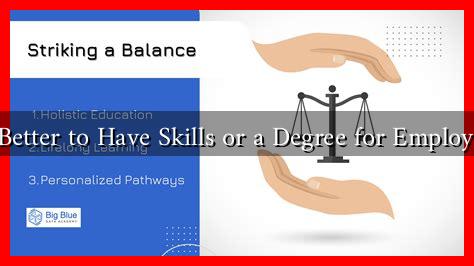-
Table of Contents
Is It Better to Have Skills or a Degree for Employment?
In today’s competitive job market, the debate over whether skills or a degree holds more value for employment is more relevant than ever. As industries evolve and the nature of work changes, understanding the importance of both education and practical skills is crucial for job seekers. This article explores the merits of each, providing insights into how they impact employability.
The Value of a Degree
Traditionally, a college degree has been viewed as a ticket to better job opportunities. Many employers still regard degrees as a benchmark for assessing a candidate’s knowledge and commitment. Here are some key points regarding the value of a degree:
- Credential Recognition: Degrees from reputable institutions often carry weight in hiring decisions, signaling to employers that a candidate has undergone rigorous training.
- Networking Opportunities: College often provides access to a network of alumni and industry connections that can be beneficial for job placement.
- Higher Earning Potential: According to the U.S. Bureau of Labor Statistics, individuals with a bachelor’s degree earn approximately 66% more than those with only a high school diploma.
For example, a study by the Georgetown University Center on Education and the Workforce found that 71% of jobs in the U.S. require some form of postsecondary education. This statistic underscores the importance of having a degree in many fields, particularly in sectors like healthcare, engineering, and education.
The Importance of Skills
While degrees can open doors, skills are often what keep them open. In recent years, there has been a significant shift towards valuing practical skills over formal education. Here are some reasons why skills are becoming increasingly important:
- Real-World Application: Skills demonstrate a candidate’s ability to perform specific tasks effectively, which is often more relevant to employers than theoretical knowledge.
- Adaptability: In fast-paced industries, the ability to learn new skills quickly can be more valuable than a static degree.
- Cost-Effectiveness: Many skills can be acquired through online courses, vocational training, or apprenticeships, often at a fraction of the cost of a traditional degree.
For instance, the tech industry has seen a rise in boot camps and online courses that equip individuals with coding and data analysis skills. Companies like Google and IBM have even started to prioritize skills over degrees in their hiring processes, recognizing that practical experience can lead to better job performance.
Case Studies: Skills vs. Degree
Several case studies illustrate the growing trend of skills over degrees:
- Google: In 2019, Google announced that it would no longer require a degree for many of its job openings, focusing instead on candidates’ skills and experience.
- IBM: IBM has implemented a “new collar” initiative, which emphasizes hiring individuals based on their skills rather than their educational background, particularly in tech roles.
- Salesforce: The company has launched programs to train individuals without degrees in cloud computing and other in-demand skills, demonstrating a commitment to skill-based hiring.
Finding the Right Balance
Ultimately, the decision between pursuing a degree or focusing on skills is not binary. Many successful professionals find a balance between the two. Here are some strategies for job seekers:
- Consider Your Industry: Research the requirements of your desired field. Some industries may prioritize degrees, while others may value skills more highly.
- Continuous Learning: Engage in lifelong learning through online courses, workshops, and certifications to enhance your skill set.
- Networking: Build connections in your industry to gain insights into what employers are looking for and to discover opportunities.
Conclusion
In conclusion, both skills and degrees have their place in the employment landscape. While a degree can provide a strong foundation and open doors, practical skills are increasingly recognized as essential for success in many fields. Job seekers should assess their career goals, industry demands, and personal strengths to determine the best path for their professional development. By combining education with practical experience, individuals can enhance their employability and thrive in today’s dynamic job market.
For further reading on this topic, you can explore resources from the U.S. Bureau of Labor Statistics and the Georgetown University Center on Education and the Workforce.

